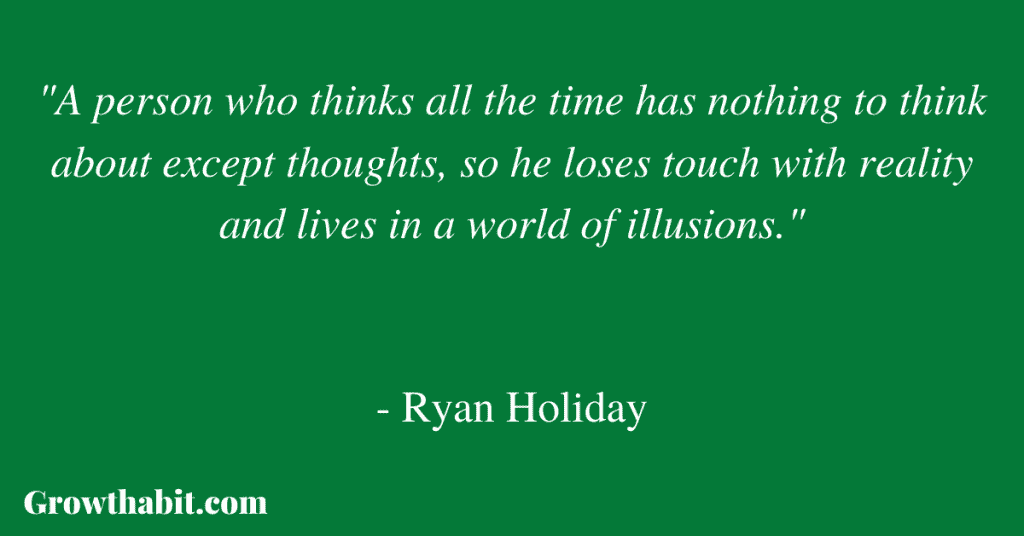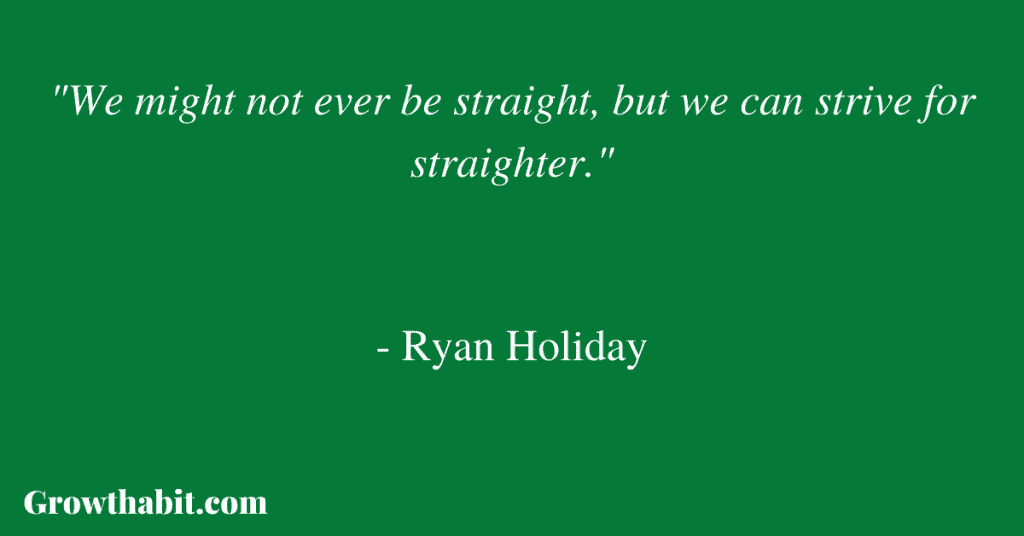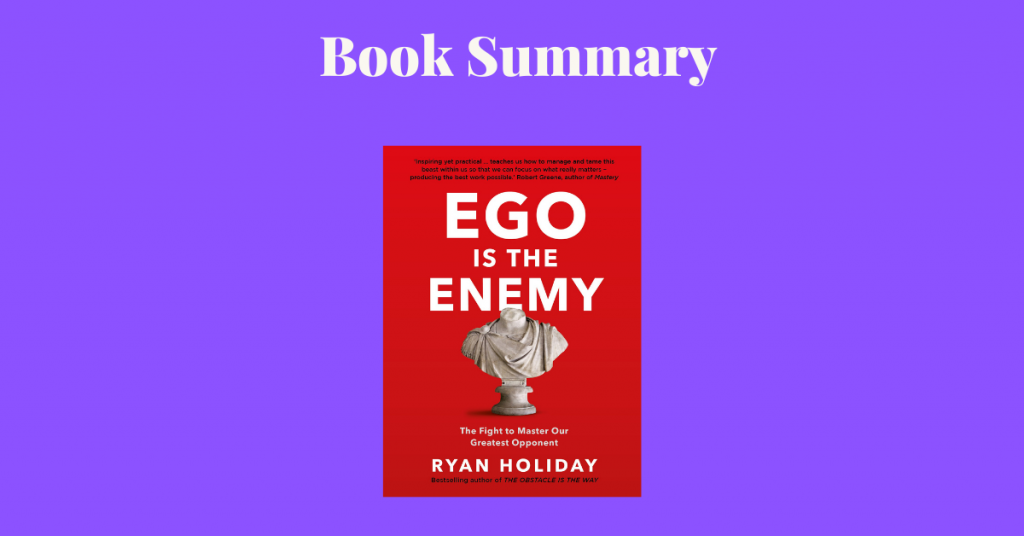Ego Is The Enemy is about the problems our ego posses to us in three distinct stages in our life— when we’re climbing toward success, when we’re on top, and when we’re falling down. The book helps us deal with ego problems in all three stages.
Book Title: Ego Is The Enemy
Author: Ryan Holiday
Date of Reading: January 2017
Rating: 9/10
What Is Being Said In Detail:
Ego Is The Enemy has a classical Ryan Holiday structure— three parts of approximately equal size filled with smaller chapters that are no longer than a couple of pages.
The structure here follows your ego on three separate occasions— during your rise to success, when you’re on top, and when you’re going down (failing).
Part 1. Aspire
Part 1 talks about:
- the slow ascent to the top that’s earned through work, not talent (Sherman example)
- the value or work instead of talk
- sticking up to your values
- becoming an apprentice
- relying on process instead of passion
- getting out of your head
- restraining yourself so you don’t do damage to yourself, your reputation, or shut down your opportunites
- and warns about the danger of early pride
Part 2. Success
Part 2 talks about:
- always staying a student (through the example of Genghis Khan)
- not telling yourself a story (that becomes a myth— staying true to yourself)
- figuring out how much success is enough success
- managing yourself
- not becoming a “larger-than-life” figure
Part 3. Failure
Part 3 talks about:
- the difference between alive time and dead time (and how to use the former)
- fulfilling your standards and not being attached to the outcomes
- having an internal scorecard
- exchanging hate for love
Most Important Keywords, Sentences, Quotes:
With success comes the temptation to tell oneself a story, to round off the edges, to cut out your lucky breaks and add a certain mythology to it all.
You know, that arcing narrative of Herculean struggle for greatness against all odds: sleeping on the floor, being disowned by my parents, suffering for my ambition. It’s a type of storytelling in which eventually your talent becomes your identity and your accomplishments become your worth.
We might not ever be straight, but we can strive for straighter.
The first principle is that you must not fool yourself—and you are the easiest person to fool. —RICHARD FEYNMAN
In short, it (the book) will help us be:
Humble in our aspirations
Gracious in our success
Resilient in our failures
Part 1. Aspire
Constantly train your intellect, he told him, “for the greatest thing in the smallest compass is a sound mind in a human body.”
What’s interesting about Sherman is that despite his connected father, almost no one would have predicted much more than regional accomplishments—least of all that he would one day need to take the unprecedented step of refusing the presidency of the United States.
Unlike Napoleon, who bursts upon the scene from nowhere and disappears in failure just as quickly, Sherman’s ascent was a slow and gradual one.
Because we will be action and education focused, and forgo validation and status, our ambition will not be grandiose but iterative—one foot in front of the other, learning and growing and putting in the time.
They work quietly in the corner. They turn their inner turmoil into a product—and eventually to stillness. They ignore the impulse to seek recognition before they act. They don’t talk much.
Or mind the feeling that others, out there in public and enjoying the limelight, are somehow getting the better end of the deal. (They are not.) They’re too busy working to do anything else. When they do talk—it’s earned.
“To be or to do? Which way will you go?”
Appearances are deceiving. Having authority is not the same as being an authority. Having the right and being right are not the same either.
Being promoted doesn’t necessarily mean you’re doing good work and it doesn’t mean you are worthy of promotion (they call it failing upward in such bureaucracies). Impressing people is utterly different from being truly impressive.
There’s a quip from the historian Will Durant, that a nation is born stoic and dies epicurean. That’s the sad truth Boyd was illustrating, how positive virtues turn sour.
If your purpose is something larger than you—to accomplish something, to prove something to yourself—then suddenly everything becomes both easier and more difficult.
Easier in the sense that you know now what it is you need to do and what is important to you. The other “choices” wash away, as they aren’t really choices at all. They’re distractions. It’s about the doing, not the recognition.
Easier in the sense that you don’t need to compromise. Harder because each opportunity—no matter how gratifying or rewarding—must be evaluated along strict guidelines: Does this help me do what I have set out to do?
Does this allow me to do what I need to do? Am I being selfish or selfless?
“It is impossible to learn that which one thinks one already knows,” Epictetus says. You can’t learn if you think you already know.
You will not find the answers if you’re too conceited and self assured to ask the questions. You cannot get better if you’re convinced you are the best.
A young basketball player named Lewis Alcindor Jr., who won three national championships with John Wooden at UCLA, used one word to describe the style of his famous coach: “dispassionate.”
As in not passionate. Wooden wasn’t about rah-rah speeches or inspiration. He saw those extra emotions as a burden. Instead, his philosophy was about being in control and doing your job and never being “passion’s slave.”
The player who learned that lesson from Wooden would later change his name to one you remember better: Kareem Abdul-Jabbar.
Passion is seen in those who can tell you in great detail who they intend to become and what their success will be like—they might even be able to tell you specifically when they intend to achieve it or describe to you legitimate and sincere worries they have about the burdens of such accomplishments.
They can tell you all the things they’re going to do, or have even begun, but they cannot show you their progress. Because there rarely is any.
Bill Belichick, the four-time Super Bowl–winning head coach of the New England Patriots, made his way up the ranks of the NFL by loving and mastering the one part of the job that coaches disliked at the time: analyzing film.
Greatness comes from humble beginnings; it comes from grunt work. It means you’re the least important person in the room—until you change that with results.

It doesn’t matter how talented you are, how great your connections are, how much money you have.
When you want to do something—something big and important and meaningful—you will be subjected to treatment ranging from indifference to outright sabotage. Count on it.
A person who thinks all the time has nothing to think about except thoughts, so he loses touch with reality and lives in a world of illusions.
A proud man is always looking down on things and people; and, of course, as long as you are looking down, you cannot see something that is above you.
The question to ask, when you feel pride, then, is this: What am I missing right now that a more humble person might see?
What am I avoiding, or running from, with my bluster, franticness, and embellishments? It is far better to ask and answer these questions now, with the stakes still low, than it will be later.
Every time you sit down to work, remind yourself: I am delaying gratification by doing this. I am passing the marshmallow test. I am earning what my ambition burns for.
I am making an investment in myself instead of in my ego. Give yourself a little credit for this choice, but not so much, because you’ve got to get back to the task at hand: practicing, working, improving.
Part 2. Success
“Man is pushed by drives,” Viktor Frankl observed. “But he is pulled by values.” Ruled by or ruling? Which are you?
“a persistent cycle of pragmatic learning, experimental adaptation, and constant revision driven by his uniquely disciplined and focused will.”
“as our island of knowledge grows, so does the shore of our ignorance.”
…his “Standard of Performance.” That is: What should be done. When. How. At the most basic level and throughout the organization, Walsh had only one timetable, and it was all about instilling these standards.
Narrative is when you look back at an improbable or unlikely path to your success and say: I knew it all along. Instead of: I hoped. I worked. I got some good breaks.
Or even: I thought this could happen. Of course you didn’t really know all along—or if you did, it was more faith than knowledge. But who wants to remember all the times you doubted yourself?
All of these are perfectly fine motivations. But you do need to know. You need to know what you don’t want and what your choices preclude.
Because strategies are often mutually exclusive. One cannot be an opera singer and a teen pop idol at the same time. Life requires those trade-offs, but ego can’t allow it.
It is not enough to have great qualities; we should also have the management of them. —LA ROCHEFOUCAULD
Ego needs honors in order to be validated. Confidence, on the other hand, is able to wait and focus on the task at hand regardless of external recognition.
There is a balance. Soccer coach Tony Adams expresses it well. Play for the name on the front of the jersey, he says, and they’ll remember the name on the back.
The astrophysicist Neil deGrasse Tyson has described this duality well—it’s possible to bask in both your relevance and irrelevance to the cosmos.
As he says, “When I look up in the universe, I know I’m small, but I’m also big. I’m big because I’m connected to the universe and the universe is connected to me.” We just can’t forget which is bigger and which has been here longer.
Part 3. Failure
Though tragic, these events were not exactly a cataclysmic failure. Graham was still rich, still white, still privileged. Still, it was not what she thought life had planned for her.
That’s the point. Failure and adversity are relative and unique to each of us. Almost without exception, this is what life does: it takes our plans and dashes them to pieces. Sometimes once, sometimes lots of times.
Bill Walsh says, “Almost always, your road to victory goes through a place called ‘failure.’” In order to taste success again, we’ve got to understand what led to this moment (or these years) of difficulty, what went wrong and why.
He faced what Robert Greene—a man who sixty years later would find his wildly popular books banned in many federal prisons—calls an “Alive Time or Dead Time” scenario. How would the seven years ultimately play out? What would Malcolm do with this time?
Most people know what Malcolm X did after he got out of prison, but they don’t realize or understand how prison made that possible. How a mix of acceptance, humility, and strength powered the transformation.
“Many a serious thinker has been produced in prisons,” as Robert Greene put it, “where we have nothing to do but think.” Yet sadly, prisons—in their literal and figurative forms—have produced far more degenerates, losers, and ne’er-do-wells.
Inmates might have had nothing to do but think; it’s just that what they chose to think about made them worse and not better.

It’s far better when doing good work is sufficient. In other words, the less attached we are to outcomes the better.
When fulfilling our own standards is what fills us with pride and self-respect. When the effort—not the results, good or bad—is enough.
John Wooden’s advice to his players says it: Change the definition of success. “Success is peace of mind, which is a direct result of self-satisfaction in knowing you made the effort to do your best to become the best that you are capable of becoming.”
“Ambition,” Marcus Aurelius reminded himself, “means tying your well-being to what other people say or do . . . Sanity means tying it to your own actions.” Do your work. Do it well. Then “let go and let God.“ That’s all there needs to be.
We take risks. We mess up. The problem is that when we get our identity tied up in our work, we worry that any kind of failure will then say something bad about us as a person.
It’s a fear of taking responsibility, of admitting that we might have messed up. It’s the sunk cost fallacy. And so we throw good money and good life after bad and end up making everything so much worse.
For us, the scoreboard can’t be the only scoreboard. Warren Buffett has said the same thing, making a distinction between the inner scorecard and the external one.
Your potential, the absolute best you’re capable of—that’s the metric to measure yourself against. Your standards are. Winning is not enough.
People can get lucky and win. People can be assholes and win. Anyone can win. But not everyone is the best possible version of themselves.
You know what is a better response to an attack or a slight or something you don’t like? Love. That’s right, love. For the neighbor who won’t turn down the music.
For the parent that let you down. For the bureaucrat who lost your paperwork. For the group that rejects you. For the critic who attacks you. The former partner who stole your business idea. The bitch or the bastard who cheated on you. Love.
It’s why the old Celtic saying tells us, “See much, study much, suffer much, that is the path to wisdom.”
Book Review (Personal Opinion):
No matter where you are in life, you can learn from this book. That’s what makes it so great. It helps you when you’re just starting out, when you’re at top, or when you’re struggling and failing.
Reading it made me help climb the ladder in a humble way. Rereading it made me aware of the mistakes I started doing once I forgot “the process.”
Rating: 9/10
This Book Is For (Recommend):
- An aspiring young professional who wants to succeed in life
- A go-getter who tasted a major victory in life
- A struggling creative who has lost its way
If You Want To Learn More
Here’s Ryan Holiday talking about Ego Is The Enemy at Google.
Google Talks
How I’ve Implemented The Ideas From The Book
I’ve used different lessons from the book in different times. When I was young, hungry, and ambitious, it helped me move the ego on the side and stay humble.
When I matured and racked up a couple of victories in life, it helped me focus on the things that got me there in the first place. The process is the one that counts. This is a book you can pick up every 5 years in your life and extract completely different lessons.
One Small Actionable Step You Can Do
Stop talking about your dreams and start doing the smallest possible things that will get you one step ahead:
- Stop talking about writing a book, write a page
- Stop talking about starting a blog, launch a website
- Stop talking about going to the gym, buy a membership

